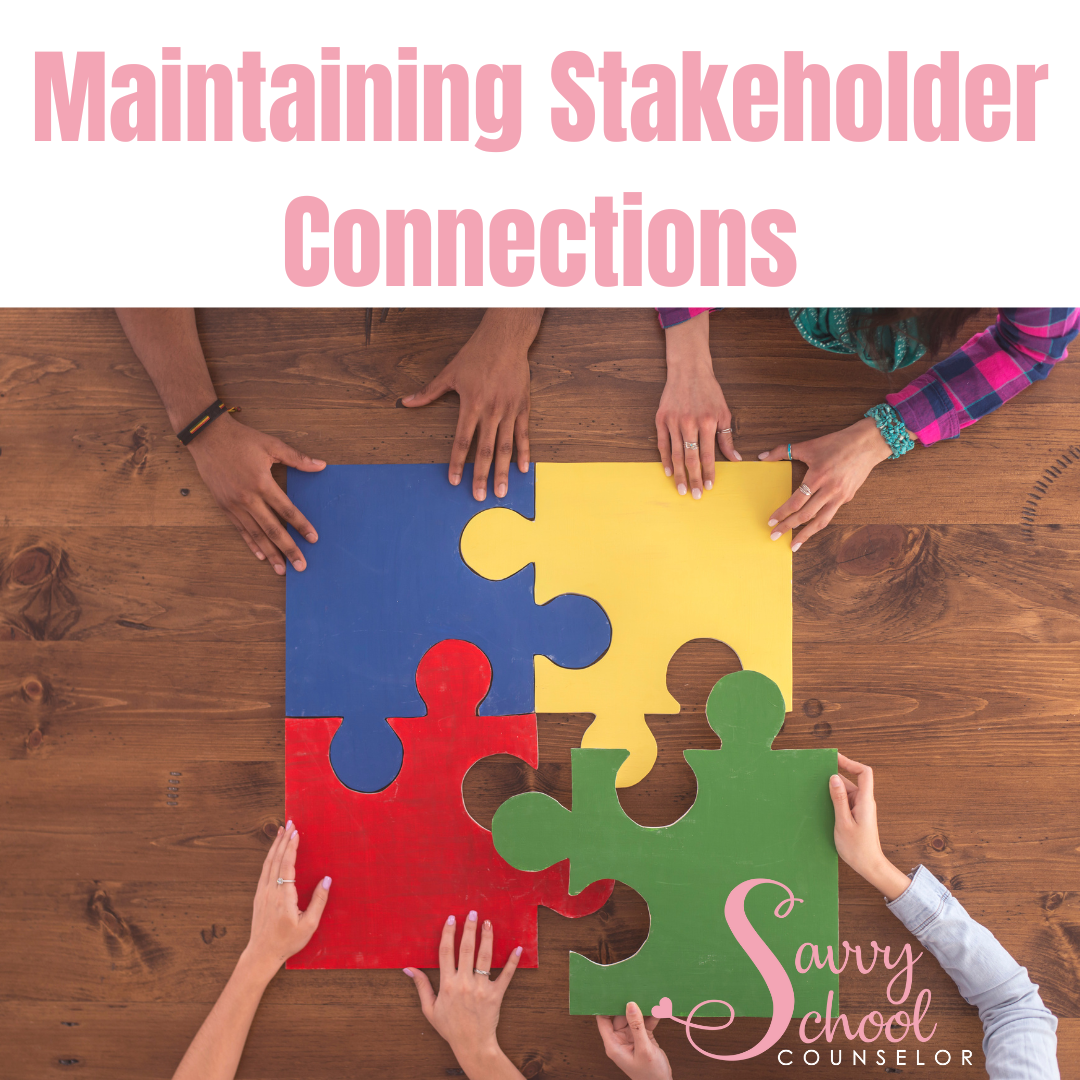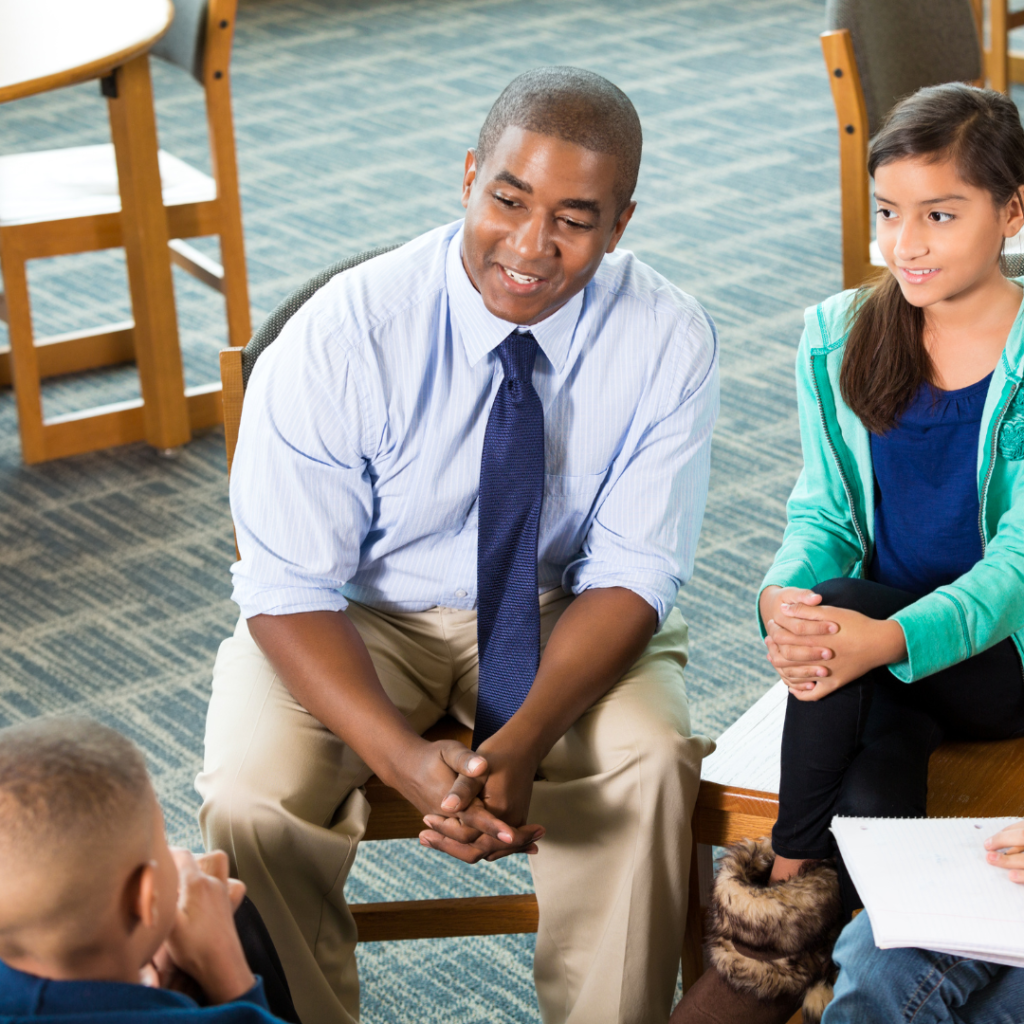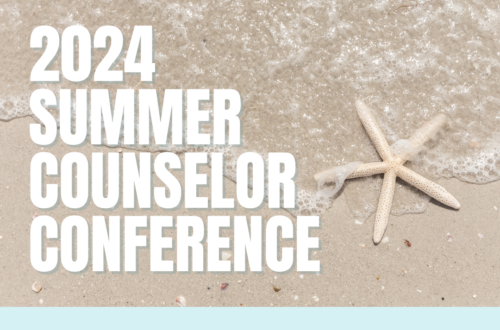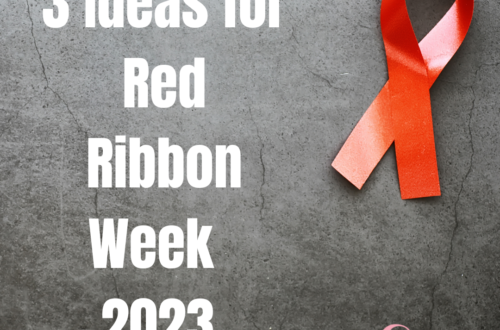
Maintaining Stakeholder Connections
Just like a business, your school and your program have stakeholder relationships to maintain. By definition, a stakeholder is a person with an interest or concern in something. In schools, they include but are not limited to the students, parents, teachers and staff, administration, community partners, and school counselor colleagues.
Your stakeholders are deeply invested in the welfare of your school community. As a school counselor, you will engage in collaboration with the majority, if not all, of these mentioned groups at various points throughout the school year.
In today’s post, we will discuss ways to maintain those connections with each of these stakeholders.
Key Stakeholders
Students
Students are the primary focus of school counselors. Everything you do should be with them in mind. You work directly with students through classroom lessons, small groups, and individual counseling sessions. Your goal is to address their social-emotional and academic needs and to increase their career awareness by introducing them to the world of work.
- Be sure to teach your students how to make self-referrals for individual counseling. Although they can ask their teachers to see the counselor, it’s important to have a way for them to do this on their own. Your Meet the Counselor lessons are a great time to share whatever form they will need to complete and the location in which they should return it in order to set up a time to meet with you.
- Make classroom lessons routine in your program. This allows you to get to know the students and helps build relationships. If they find themselves in a position where they need to meet with you one-on-one, you will not be a stranger to them.
- As your schedule allows, provide small groups that meet the needs of your school. Lunch Bunches are also a great way to incorporate small groups that are not ongoing. Lunch is not likely to be the best option for a 4-6 week small group.

school counselors.
Parents/Guardians
Parents and guardians are important partners in the well-being and education of your students. It is important to always keep the lines of communication open and to include these stakeholders whenever necessary in matters that concern their child(ren).
- Be sure to introduce yourself to all parents and guardians in some way. Create a brochure, flyer, or letter to be sent home with all students to let parents/guardians know who the school counselors are, where they are located, and how they can be reached.
- Include parents on your advisory council in order to get their feedback and suggestions for your school counseling program. It is always helpful to have a parent’s perspective.
- Consider a quarterly update for parents letting them know what you’ve covered in your program with each grade level and what’s ahead. This can be done electronically or via a printed newsletter.
Teachers and Staff
Without a doubt, school counselors work closely with the teachers and staff at their school. This stakeholder collaboration is essential in order to understand the unique needs of each student and to provide the appropriate support. Sharing information about students’ academic performance, behavior, and emotional well-being can lead to more effective interventions.
- Provide a way for teachers to make student referrals. This could be a printed form or a Google form. Make sure that the form includes a place for teachers to share any strategies or interventions they may have already tried so you have a good idea about how to approach each individual situation.
- Make yourself available for any “kid-talk” sessions to help teachers brainstorm possible strategies they can use in the classroom for different student issues.
- That same quarterly update idea for parents can also be utilized with teachers and staff. It is very important for them to know the skills you are sharing with their students so they are able to reinforce them during their time together.
Administration
Your principal is responsible for heading up school-wide policies and procedures, providing resources for the school, and establishing the overall school environment. It’s important to collaborate with this key stakeholder to ensure that your counseling program aligns with the school’s goals and that necessary resources are available.
- One of the first things you should always do at the beginning of the year is meet with your principal to discuss your goals for the school year. This can be done using the ASCA Annual Agreement form. This form allows you to share how you plan to address the current needs of your student population and also provides an area for you to calculate your use of time. Even if you don’t use the Annual Agreement form, it’s always a great idea to discuss your plans with your principal.
- Be sure to follow up with your principal regarding any crucial student needs or necessary outside referrals for students so that you keep him or her in the loop. There are many times that school counselors are handling important things like CPS referrals before anyone can be made aware. Always keep your administration current and aware of what’s going on.
- Include your principal or assistant principal on your advisory council. This is another great time for them to learn more about your school counseling program and the goals you have set for the year.
Community Partners
Establishing relationships with local community organizations, mental health professionals, social services, and other resources can extend your support network and provide additional resources for students who face challenging times. You definitely need these stakeholders in your corner.
- Find local churches in your area that can support your students who are economically challenged. Many will provide snacks and food regularly for students in your backpack buddy program along with book bags and school supplies at the beginning of the year.
- Find time to meet with any local organizations that provide services to children in your district. Many times, these meetings can be held during regional or district-wide school counseling meetings. Doing this will allow you to begin building partnerships within the community and will also provide a great learning opportunity.
- Utilize businesses and community helpers for school events. Whether you’re looking for career fair guests or you’re in need of donations for a school cause, these relationships can really come in handy.
School Counseling Colleagues
If your school has multiple counselors or student support staff, collaborating with them can lead to a more comprehensive approach to addressing students’ needs. I talked about this collaboration in my blog post Counseling Co-Workers: Two Heads are Better Than One. If you are not a solo school counselor, you and your team or partner are also stakeholders to each other. Collaboration is so important.
- Work together! Discuss possible yearly goals and come to an agreement together as to what they will be. Remember: There’s no I in TEAM.
- One thing I believe strongly is that in elementary schools, school counselors should make a point to connect with all students. I personally don’t suggest the one counselor takes K-2 and the other counselor takes 3-5 approach. If you share the caseload and alternate between grade levels, your students will have a relationship with both counselors. When and if they find themselves needing individual counseling, they will never find themselves with a stranger. I do understand that this is a completely different challenge after elementary school.
- Meet with other school counselors in your district regularly. Depending on the size of your county, this may mean regional cohorts. I have learned over the years that these meetings have proven to be extremely helpful and that they provide an extended area of support for bouncing around ideas and discussing strategies for helping kids on your caseload.
As I said earlier, everything school counselors do is with students in mind. Maintaining connections with each of these key stakeholders will help you create a well-rounded and impactful school counseling program which will in turn address the variety of needs your students present.
How do you connect with your stakeholders?
Stick around! You can follow Savvy School Counselor with free email updates. You can also follow my TpT Store to keep up with my latest products and freebies. Additionally, I do giveaways through My Facebook Page with my new products. Be sure to like Savvy School Counselor on Facebook and click to receive notifications so you don’t miss them!
Related Posts via Categories





